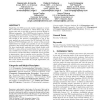609 search results - page 82 / 122 » Modelling and Checking Timed Authentication of Security Prot... |
148
click to vote
CCS
2008
ACM
15 years 4 months ago
2008
ACM
Wireless communication enables a broad spectrum of applications, ranging from commodity to tactical systems. Neighbor discovery (ND), that is, determining which devices are within...
126
click to vote
JUCS
2008
15 years 2 months ago
2008
Unknown Key-Share (UKS) resilience is a basic security attribute in authenticated key agreement protocols, whereby two entities A and B should not be able to be coerced into shari...
127
click to vote
CCS
2008
ACM
15 years 4 months ago
2008
ACM
Single-Sign-On (SSO) protocols enable companies to establish a federated environment in which clients sign in the system once and yet are able to access to services offered by dif...
138
click to vote
TCC
2009
Springer
16 years 3 months ago
2009
Springer
The first and still most popular solution for secure two-party computation relies on Yao's garbled circuits. Unfortunately, Yao's construction provide security only again...
JALC
2006
15 years 2 months ago
2006
In this paper we present an extension of Dolev-Yao models for security protocols with a notion of random polynomial-time (Las Vegas) computability. First we notice that Dolev-Yao ...


